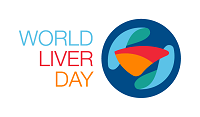Promoting Liver Health Awareness and Prevention of Liver Diseases Globally |
 |
The European Association for the Study of the Liver (EASL), the American Association for the Study of Liver Diseases (AASLD), the Asian Pacific Association for the Study of the Liver (APASL),the Asociacion Latinoamericana para el Estudio del Higado (ALEH), and the Society of Liver Disease in Africa (SOLDA) jointly call on the World Health Organization (WHO) to endorse the establishment of a World Liver Day on April 19 every year.
In 2019, India launched World Liver Day to raise awareness about liver related diseases. This year on 19 April, the major liver associations expand this initiative into an international movement aimed at improving awareness on liver health, and ultimately working with stakeholders to decrease its major socio-economic burden worldwide.
International health days play a vital role in raising awareness for major health issues. World Liver Day strives to promote prevention campaigns, improve screening strategies, and increase access to timely and effective treatment. The initiative is a step towards bridging the gap between population health needs and policy-makers priorities, leading to a more aware and healthier world.
“World Liver Day is about urging governments to recognize the increasing burden of alcohol and obesity on the population and advocating for stronger prevention strategies to reduce liver disease and improve liver health worldwide,” said Thomas Berg, EASL Secretary General.
“World Liver Day serves to bring the needed awareness to liver diseases. It is a day to focus on how to keep the liver healthy over a lifetime,” said Norah Terrault, AASLD President.
“We need to alert the population about the presence of liver disease even in those individuals without any symptoms,” said Mario Pessoa, Vice President of ALEH.
“World Liver Day is meant to unite the voices of all affected by liver-related issues under one banner of prevention, promotion, and a long healthy life,” said Manal H El-Sayed, Chair of SOLDA.
The World Liver Day campaign will span over a period of three years. In 2023, the focus will be on raising public perception about liver diseases and breaking the stigma associated with them. In 2024, efforts will be directed towards seeking solutions and involving all relevant stakeholders to implement concrete activities, such as tailored educational programmes. Finally, in 2025, governance proposals will be put forward to tackle these issues in a concerted manner.
The liver is a remarkable organ, performing over 500 functions and regenerating itself with just 25% of healthy tissue. Despite affecting 844 million people globally and causing 2 million deaths per year, liver diseases are often overlooked in the global health agenda, leading to gaps in strategies to address this growing burden.
Non-Alcoholic Fatty Liver Disease (NAFLD), affecting up to 25% of people globally and linked to rising obesity and diabetes rates, has been excluded from WHO's global action plans for non-communicable diseases. Liver cancer is a growing global health problem, with an estimated 905,677 cases in 2020. Viral Hepatitis presents further health challenges, with death rates now surpassing those of HIV/AIDS.
Stigma creates barriers to disease awareness and access to care for at-risk populations such as drug users, those with alcohol disorders, and people with obesity. Liver disease is often stigmatized as being caused by alcohol or drug abuse, leading to shame and isolation for those with the condition. This stigma can also cause reluctance to seek medical treatment or disclose the condition to others. Misbeliefs that liver disease is contagious and social ostracisation in some cultures further add to the stigma. Overcoming this stigma is crucial to improving access to care and promoting health policies.
World Liver Day aims to catalyse better health policies that put people first, prioritise healthy lifestyles, and leave no organ behind.
About the European Association for the Study of the Liver (EASL)
EASL, the European Association for the Study of the Liver, founded in 1966, is a medical association dedicated to pursuing excellence in liver research, to the clinical practice of liver disorders, and to providing education to all those interested in hepatology. As of 2023, EASL serves 4,900 members.
About the American Association for the Study of Liver Diseases (AASLD)
AASLD is the leading organization of clinicians and researchers committed to preventing and curing liver disease. The work of our members has laid the foundation for the development of drugs used to treat patients with viral hepatitis. Access to care and support of liver disease research are at the center of AASLD’s advocacy efforts.
About the Latin American Association for the Study of the Liver (ALEH)
ALEH is a scientific society that aims to advance the study and practice of hepatology in Latin America. Our primary objective is to promote and disseminate knowledge, experiences and advances in the field, through active collaboration and exchange with local and international specialists, institutions, and the wider community.
About the Asian Pacific Association for the Study of the Liver (APASL)
APASL is one of the leading associations based on investigation and treatment of liver diseases in the world and the largest scientific body that upholds the standards and profession, research and create improved treatment methods for millions of liver patients particularly in the entire Asia Pacific Region.
About the Society on Liver Disease in Africa (SOLDA)
Transforming liver health in Africa though collaboration, education, scientific exchange, and consensus. SOLDA’s main objective is to advance and disseminate the science and practice of hepatology through educational activities, conferences, and partnerships. We foster research and facilitate consensus and practical guidance. In creation of a community of hepatology scientists and clinicians throughout Africa, we promote communication between healthcare professionals throughout the region.